Lorem Ipsum has been the industry's standard dummy text ever since the 1500s, when an unknown printer took a galley of type and scrambled it to make a type specimen book. It has survived not only five centuries, but also the leap into electronic typesetting, remaining essentially unchanged. It was popularised in the 1960s with the release of Letraset sheets containing Lorem Ipsum passages, and more recently with desktop publishing software like Aldus PageMaker including versions of Lorem Ipsum.
Lorem Ipsum has been the industry's standard dummy text ever since the 1500s, when an unknown printer took a galley of type and scrambled it to make a type specimen book. It has survived not only five centuries, but also the leap into electronic typesetting, remaining essentially unchanged. It was popularised in the 1960s with the release of Letraset sheets containing Lorem Ipsum passages, and more recently with desktop publishing software like Aldus PageMaker including versions of Lorem Ipsum.
The National Forum Against Gender Based Violence Sri Lanka strongly condemns the recent incident of grave sexual violence committed against a girl child who succumbed to her brutal injuries of physical and sexual abuse on the 8th of July 2020. The Forum expresses its serious concern and notes that this is another act of sexual and gender-based violence within the increasing incidence of violence against women and girls in public and private spheres during the lockdown in Sri Lanka as witnessed in the escalation in the cases reported during this period
Globally 1 in 3 women and girls are subjected to either physical and/or sexual intimate partner violence or non-partner sexual violence in their lifetime. This culture of violence must never be condoned. Although the Government of Sri Lanka has taken measures to develop laws, policies and programmes to respond to Gender-Based Violence (GBV), it remains one of the most prevalent human-rights violations in the country.
We urge the authorities and policy-makers to strengthen the protection of women and children through the law and policies while making sure that cross-sectoral coordination and effective responses, including the timely prosecution of perpetrators are strengthened in the country.
We encourage all citizens to stand in solidarity with and support survivors of Sexual and Gender Based Violence and strengthen the institutional mechanisms to prevent these violations.
COLOMBO, Sri Lanka (25 November 2019): More than one third of women have faced gender-based violence at some point of their life, which makes this one of the most prevalent human rights violations in the world. Yet, it remains a topic that is surrounded by secrecy, stigma and taboo, due to societal denial. When the human right to live free of violence is sacrificed, we perpetuate further violence, mental trauma, and vulnerability upon individuals and society as a whole.
Women and girls are more vulnerable during humanitarian crises, and this is why in the aftermath of the Tsunami, Sri Lanka established the National Forum Against Gender-Based Violence (GBV). Co-chaired by UNFPA and OXFAM, the National Forum Against GBV is a collective of over 50 organizations representing Government, UN Agencies, national and international non-governmental organizations, community-based organizations, and individual experts in the field.
This year marks 15 years since the National Forum has been lobbying and advocating towards zero tolerance for gender-based violence in Sri Lanka. Commemorating this milestone, a press conference was held on the theme ‘United towards creating violence-free spaces for women and girls’, which highlighted the need for safer spaces at home, in the workplace, and on public transport. The press conference coincided with the global campaign '16 Days of Activism Against Gender-based Violence', which runs each year from 25 November, the International Day for the Elimination of Violence against Women, to 10 December, Human Rights Day.
Delivering the opening remarks, Ms Ritsu Nacken, Co-Chair of the Nation Forum Against GBV and the UNFPA Representative in Sri Lanka, said: “Women are held back by the consequences of gender-based violence. We must raise our voices and stand firmly against it, and ensure that there is appropriate policy action to put an end to it. Given the recent public discourse on the release of a murder convict, it further highlighted the brutality of such incidents which are very real and pertinent. While 15 years of continuous efforts of the National Forum have ensured that we’ve achieved a much safer Sri Lanka for women and girls, there is still a long way ahead of us before we truly achieve gender equality.”
Mr. Bojan Kolundzija, Co-Chair of the National Forum Against GBV and the Country Director of OXFAM Sri Lanka added, “As the National Forum, we have continuously and consistently raised public awareness regarding the gravity of gender-based violence within Sri Lanka, and advocated for policy change. But there is much to be done. We must ensure a Sri Lanka where everyone can be held accountable for incidents of violence, regardless of whether it occurs at home, at work or on public transport, by triggering a societal shift in the perspective towards this issue.”
A pledge was signed by all members of the National Forum, recommitting its collective work towards ending all forms of gender-based violence in Sri Lanka.
COLOMBO, Sri Lanka (1 Mar 2019): “I was travelling in a bus when the man seated next to me started to touch my thigh, while he was pretending to sleep. When I confronted him, I knew he would try to escape, especially since he had already made several such attempts. This is not the first time this has happened”, said Shalinie, a victim of sexual harassment in public transport.
Shalinie is not alone. According to a study conducted by the United Nations Population Fund (UNFPA) - 90% of women and girls have endured sexual harassment at least once in their lifetime on public buses and trains. Only 4% of those affected reported the incident to the police.
Sexual harassment is a grave violation of human rights. Leading up to International Women’s Day, UNFPA together with the Colombo Municipal Council, Ministry of Women and Child Affairs, and the Ministry of Transport and Civil Aviation, opened a public exhibition titled “Does She Travel Safe?” featuring real stories of women and girls like Shalinie who have faced sexual harassment in public transport in Sri Lanka. Their stories show a clear indication of the existence of power structures that perpetuate norms and attitudes discriminating women and girls.
At the opening of the exhibition the Mayor of Colombo, Her Worship Rosy Senanayake, stated, “Sexual harassment in public transport is a priority national issue that needs continuous policy level action. It is important that women are part of the planning and implementation of development projects to ensure a holistic approach towards making Colombo a safer space for all women and girls.”
Ms. Ritsu Nacken, UNFPA Representative in Sri Lanka, added, “While we strive to see a Sri Lanka where women and men can travel together as equals with no sense of intimidation or harassment, we acknowledge the Ministry of Transport’s recent decision to have female-only compartments in trains. This action also implemented in Japan, India, and other countries, can serve to generate further awareness on the issue, and will hopefully be a means to a more sustainable solution in the future.”
The photo and video collection was developed as part of a collaboration between UNFPA and ‘Cheer Up Luv’ – an initiative by UK Photographer Eliza Hatch. The public installation is delivered in collaboration with the Rotaract Club of AOD, and will be open to the public from 2nd to 8th March 2019 from 8.00 am. – 8.00 p.m. at the Colombo Town Hall Grounds. As part of the exhibition, UNFPA in partnership with Civil Society Organizations and Activists, will deliver awareness sessions for school students, bus drivers and conductors, and to the public, on how to speak up, intervene, and be the change.
As the lead UN Agency working to address gender-based violence in Sri Lanka, UNFPA works closely with the Government, UN Agencies, Diplomatic Community, Civil Society Organizations, Private Sector, Individual Activists, and the Media, to create a safer Sri Lanka for all women and girls.
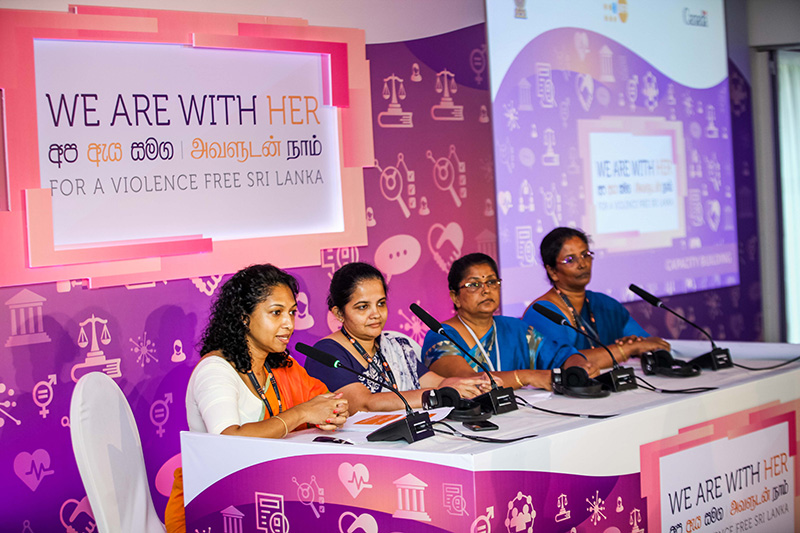
COLOMBO, Sri Lanka (06 June 2019): Violence against women and girls is widely recognized as an international public health and human rights concern. 1 in 3 female homicides in Sri Lanka are related to intimate partner violence and 69% of such incidences go unreported, according to a study done in 5 provinces commissioned by the United Nations Population Fund (UNFPA).
In 2018, the High Commission of Canada to Sri Lanka issued a grant of CAD 900,000 to UNFPA in support of addressing sexual and gender-based violence by strengthening public institutions. The 2.5 year project ‘We are With Her’ is implemented by UNFPA in collaboration with the Ministry of Women and Child Affairs and Dry Zone Development, the Department of Census and Statistics, and the Human Rights Commission in Sri Lanka. The project aims to ensure public sector officials stand with survivors of gender-based violence to provide essential services that support their safety, wellbeing and access to justice.
On 6 June 2019, a progress review consultation was held to share highlights of the current work that has been completed through the project, and to discuss the way forward. Speaking at the meeting, Ms. Dharshana Senanayake, Secretary to the Ministry of Women and Child Affairs and Dry Zone Development stated, “Evidence-based policies on violence against women is critical to ensure that we leave no one behind. UNFPA and the High Commission of Canada to Sri Lanka has contributed greatly in strengthening the capacity of our officials to address sexual and gender-based violence in the country”.
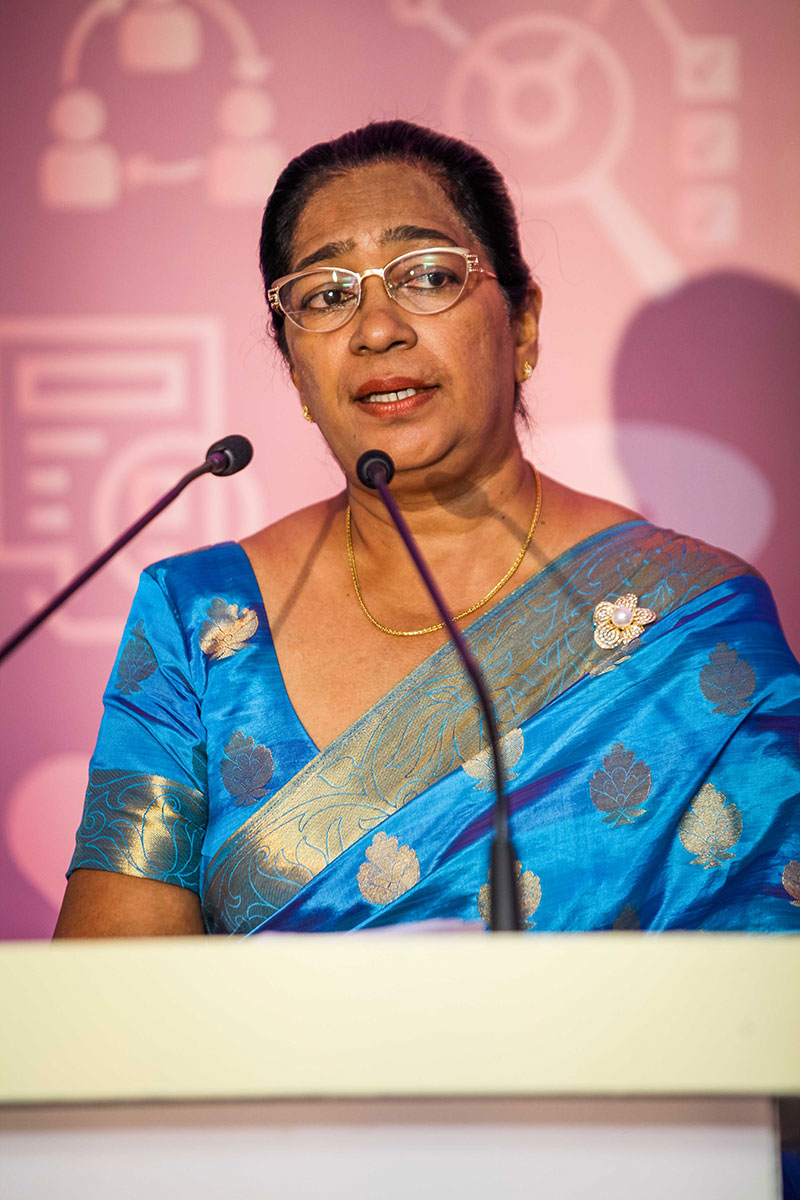
Ms. Indu Bandara, Director General of the Department of Census and Statistics who was also present at the meeting further added that, “Data on violence against women and girls is crucial to understanding the magnitude of the issue, and to ensure an institutionalized and coordinated response to support survivors of violence”.
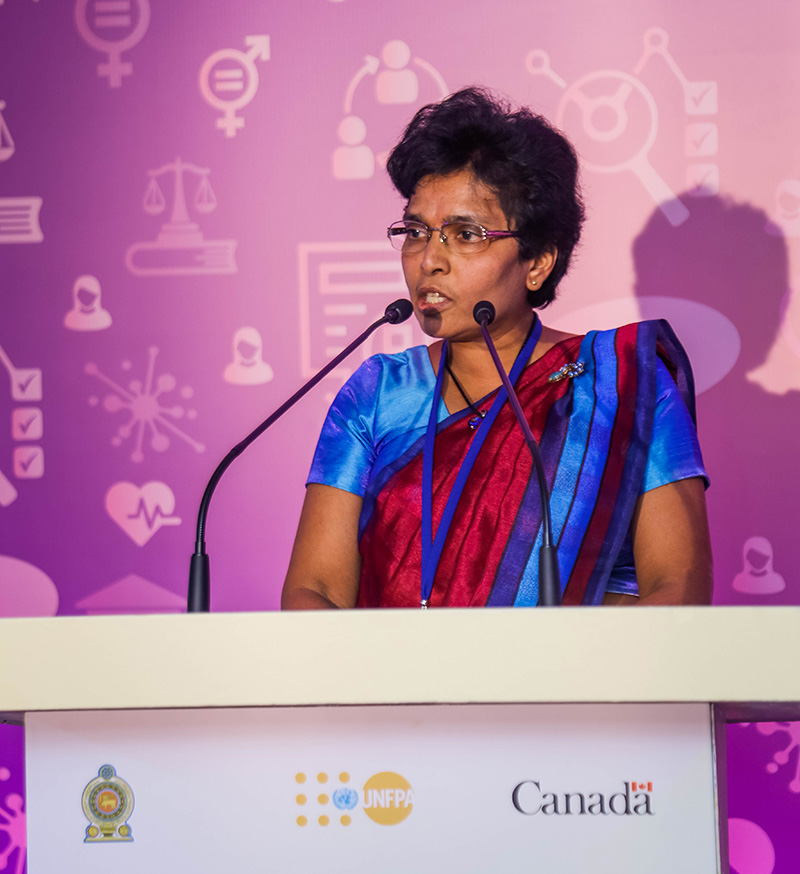
Further, Ms. Ritsu Nacken, UNFPA Representative highlighted: "The tragedy of the Easter Sunday attacks reminded us all of the urgent need to address the issue of violence. Addressing gender-based violence is an important step towards creating a peaceful Sri Lanka, and promoting gender equality is a critical part of the country’s journey towards a more inclusive society, which respects and promotes diversity".
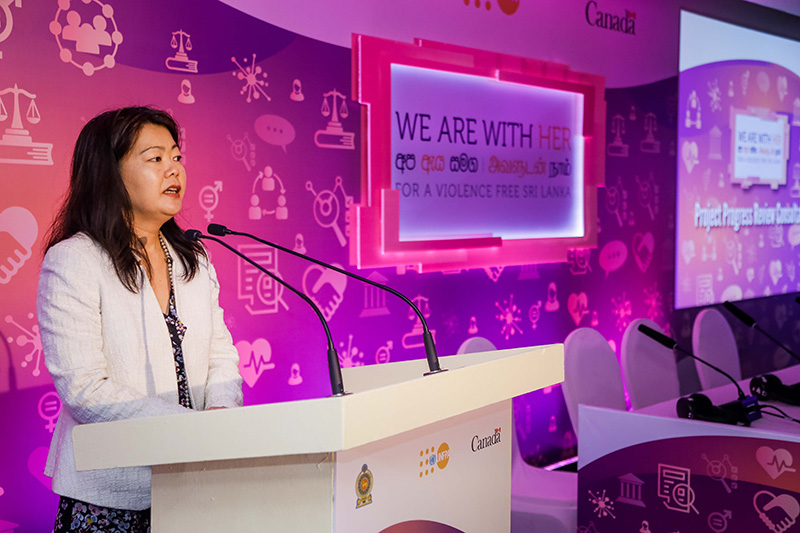
Mr. Claude Goulet, Counsellor (Development) and Head of Cooperation to the High Commission of Canada to Sri Lanka added, “A major barrier to gender equality is sexual and gender-based violence. Canada is extremely happy to be a part of this project, which is one of the key initiatives of Canada’s Feminist International Assistance Policy”.
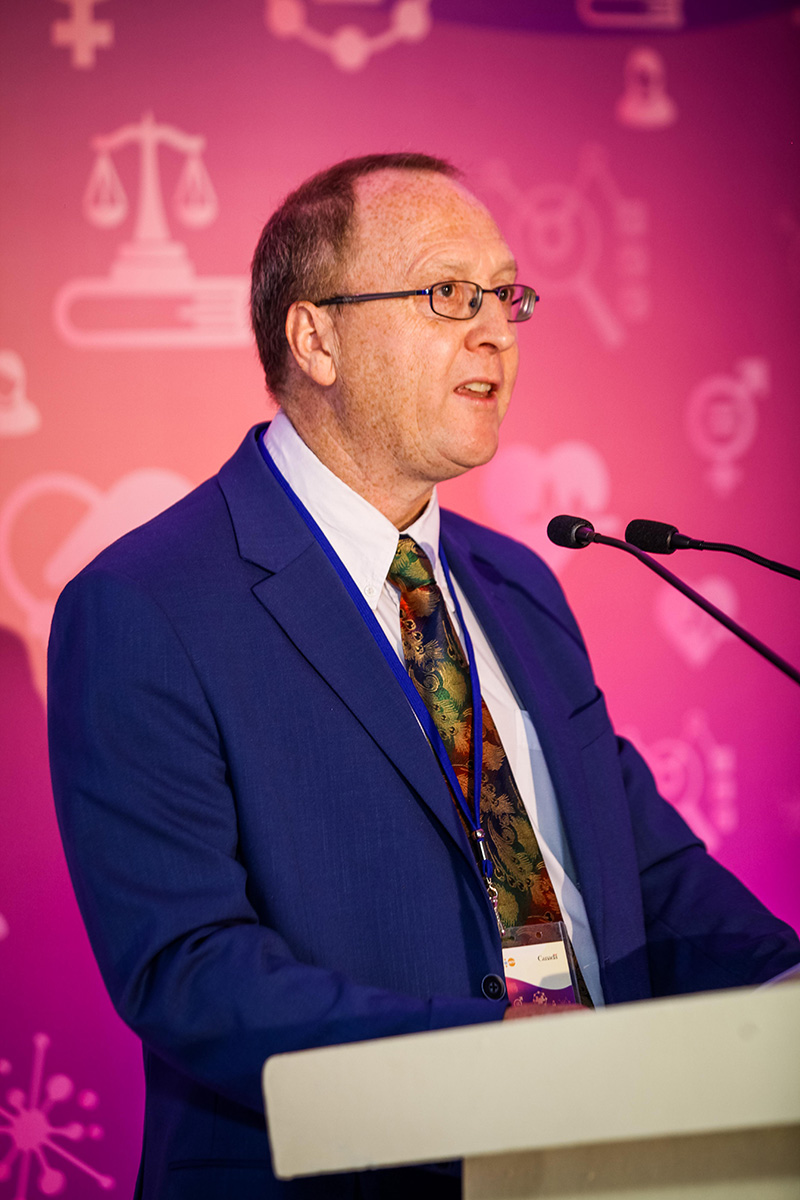
Speaking on the importance of understanding structural violence, Dr. Deepika Udagama, Chairperson of the Human Rights Commission in Sri Lanka emphasized that, “Sexual and gender-based violence is so normalized because of the socialization process that lays down how men and women should behave. This affects the reproductive health and rights of women. Do women have the number of children they have, because they want to? Or is it because it is a cultural obligation?” She further added that, “Sri Lankan women have achieved so much over the past few years, yet our progress is lagging because of structural violence”.
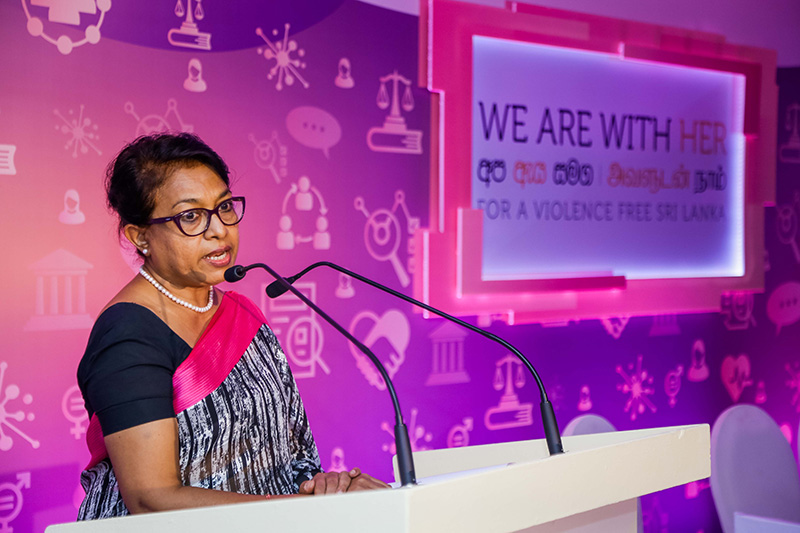
To eliminate all forms of violence against women and girls, every police officer, every legal officer, every doctor, every nurse, and each and every public official should stand with her. Because, it is only if WE are with HER, that we can create a violence free Sri Lanka.
(A Walk organized by the Women’s Education and Research Centre as a IWD 2018 venture, calling for the safety of women)
The Women’s Education and Research Centre (WERC) as its International Women’s Day initiative, undertook to create awareness on the issue of violence against women and called for a sexual violence free country. On the 5th of March, 2018, women from different women’s organizations and like-minded organizations together with the Ministry of Women’s Affairs, gathered at dusk in front of the Fort Railway Station to begin their Walk under the banner “Safe Nights! Safe Streets! Safe Homes!” As darkness fell, with the Railway Station bustling with people rushing home from work, approximately 300 women and men of all religions, ethnicities and ages, began their Walk, signifying the need for safety for women on the streets at night. Among the participants were women and men from all walks of life, including women politicians, eminent professors and women’s rights activists. Each participant carried a torch and the Walk began with a lusty chorus of slogans that called for safety for women – at night, on the streets and in their homes. The slogans strongly condemned attitudes that took the night time away from women through negative societal attitudes. The occurrence of sexual violence is often attributed to the dress the women wore at the time of attack or to the time she was out on the streets.
The IWD Walk was a timely effort in the context of the rising incidence of violence against women in our country. As we are all aware, women and girls who commute after dusk, walk the streets gripped by fear of different degrees of violence ranging from catcalls, sexual harassment to gang rape. Women just like other citizens of this country have the right to walk the streets fearlessly at all times whether it be in the village or in the town. “Recent cruel and horrendous crimes perpetrated against women in our country, compel us to collectively raise our voices to put an end to sexual violence,” said a participant.
The active participation of women and men of all ages was significant and was indicative of the fact that this was a concern not only of women but society as a whole. The slogans shouted out in all three languages signified this issue as one that affects all women of our country. One young woman expressed it this way “sexual violence affects our families, homes and our loved ones, and we need to break the silence around it that has hidden its occurrence and prevented adequate action.”
The Walk ended up at the Galle Face Green with speeches by Women’s Rights Activists, Lawyers and women politicians and the media. Meaningful creations in poetry and song were rendered which added to the mood of the IWS Walk.
The event ended with a Statement of hope read in all three languages by the Women’s Education and Research Centre:
“From here, we march on, in the hope of a better future for women - where nights are safe, the streets without violence and their homes are safe. We march on in hope!”
Oxfam in support of the National action plan to address sexual and gender based violence, supported the Ministry of women and child affairs to pilot vigilant committee trainings in 6 divisional secretariats in Killinochchi, Gampaha, Ratnapura, Kalutara and Hatton. This included the training of 300 government officials including divisional women unit officials and Grama Niladhari’s. Through the trainings the administration has been able to create vigilance to prevent and intervene Sexual and Gender Based Violence in these divisional secretariats.
In support of Oxfam’s ENOUGH campaign, Oxfam in Sri Lanka hosted Sharanya Sekarem and Anam Parvez (from Oxfam GB) who brought together a group of partners, private-sector and government official and activists, to better understand the many facets of gender-based harassment in public transport.
Oxfam’s facilitators are currently in Batticoloa and Kilinochchi (and will be in Kandy soon) where the first leg of our research is underway. The team is working to collect data on harassment in public transport in support of our ENOUGH campaign research.
Elect Her End Violence Campaign in the North which was hosted by Chrysalis in November 2017, and below are few key participants.
Moreover, we hosted an event in parallel to the 16 Days A group of aspiring female political leaders from the North of Sri Lanka participated at the 'Vote for Women Walk' that was organized by the Ministry of Provincial Councils and Local Government in Colombo recently.
The group of ladies also had the opportunity to meet current and past political leaders at a discussion forum organised by Chrysalis. Veteran political leader Mrs. Ferial Ashroff also graced the occasion.
Oxfam and partners travelled to Batticoloa to raise awareness on violence and discrimination faced by women in politics. The Batticoloa Bus Station brought together an enthusiastic crowd, who (despite the rain!) enjoyed the street drama performance and educational sessions on women’s right to participate in elections with no threat to their safety.
Launch of One Billion Rising (OBR) Sri Lanka and the 16 Days of Activism against GBV. Trailer